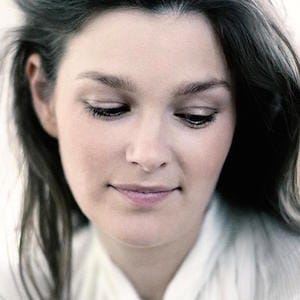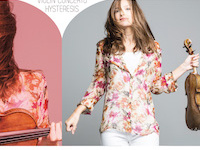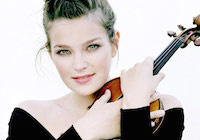Violin Concerto (2014)
for solo violin and orchestra
- part I 8’42
- part II 8’07
- part III 8’29
Royal Concertgebouw Orchestra
Vladimir Jurowski – conductor
Janine Jansen – violin
Hysteresis (2013)
for solo clarinet, ensemble and soundtrack
- part I 11’44
- part II 5’42
Amsterdam Sinfonietta
Candida Thompson – artistic director
Kari Kriikku – clarinet
Buy
| CD (Violin Concerto & Hysteresis) | |
| Price includes download MP3 version. | |
| Download | MP3 (320 kbps) | WAV |
|---|---|---|
| Bundle (Violin Concerto & Hysteresis) | ||
| Violin Concerto | ||
| Hysteresis | ||
| Difference between MP3 and WAV formats is explained in our shop FAQ. | ||
Liner notes

The work turns on those facets of her playing that transcend mere technical mastery. He investigates what he describes as her ‘musical DNA’, primarily the energy that players of her calibre transmit to their musical partners as a matter of course. This starting point sets the tone for the concertante repartee between the soloist and the orchestra. Rapid tonal figures from the violin are taken over first of all by the musicians sitting closest to the soloist. The principal cellist and the orchestra’s leader both play pivotal roles in this transfer, forming a ‘mini trio’ with the soloist, physically in the midst of the orchestra, in the central movement. ‘I do this partly to keep the music transparent where I want to feature Janine specifically and partly to give the listeners a theatrical experience of the energy flow among the players.’
Janine, according to Van der Aa, ‘can do things you don’t get so readily from other players. It has to do with strength – power in those passages where she has to use her entire body to enhance lyricism with a sort of percussive edge. Those notes – something extra happens at these most difficult moments that wouldn’t with someone else, something theatrical that transmits straight to the audience. She does this out of a sort of physical-biological compulsion that I recognise, since that’s also what composition means to me.’
In Hysteresis (2013) for clarinet, ensemble and soundtrack, premiered in London in April 2014 by clarinettist Mark van der Wiel and the London Sinfonietta, the concertante element also serves as backdrop to an investigation of sounds at the interface between analogue and digital, of sounding reality and processed memories that subsume the material within themselves, like the carrier of a musical gestation.
It opens, symbolically, like a clash between two worlds. The clarinet sets out like a fairy-tale figure stepping out from a painting, amidst an aura of clicking and rustling sounds on soundtrack and a percussionist stroking his hand in circles over a table strewn with sand, emulating the sound of an old gramophone. But this does not release the soloist from the sound-annex memory module. The hysteresis is born from the confrontation between the live instrument and digital clarinet residues that take on their own lives over the course of the work, just as the clicking of the turntable is transformed into a digital rhythm. ‘Distant clarinet echoes’, ‘distant clarinets’, ‘A-Bb echo’, ‘turntable scratching’, ‘parallel chords’, ‘distant orchestra, slowing down’ – the soundtrack behaves like a wellspring that gives and takes, like an eavesdropper, a digital crossroads for incoming and outgoing signals, all set against the backbone of the modular analogue synthesizer that Van der Aa uses for the first time in this piece.
The clarinet, for Van der Aa a very special instrument due to the ease with which it can move between diverse stylistic poles and produce tones that are almost as pure as sine waves, is perpetually at the focal point of events thanks to the compact accompanying ensemble. And how! The orderliness of the concept is diametrically at odds with the completely spontaneous, exhilarating nature of the music, which excels in a jazz-rock kind of synthesis of improvisational agility and the physical drive of a rhythmic base line that inclines towards dance. The thing that connects the two pieces on this CD is the trans-cultural generosity of spirit that enmeshes the popular and the extremely complex with each other, in a language that has managed to liberate itself from the eternal friction between ‘high’ and ‘low’ cultures. One might argue that the composers of Van der Aa’s generation, rooted in pop culture, have moulded a new, cosmopolitan meta-language from an incongruous mix of the stylistic modes so feared by puritan modernists such as Boulez. And thus what is an inherently conformist genre can be heard here striding out along new pathways.
— Bas van Putten (excerpt from liner notes)

